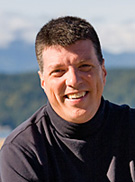
A version of this story was originally published in the Fall 2012 UW SRP eBulletin.
Professor Joel Baker is the Port of Tacoma Chair in Environmental Science at the University of Washington-Tacoma. In addition, Dr. Baker is director of the Puget Sound Institute, which is a product of a coordinated effort between the Environmental Protection Agency (EPA), the Puget Sound Partnership and the University of Washington. The intention of the Institute is to bridge the gap between the scientific community and those charged with the restoration and protection of the Puget Sound.
Dr. Baker was the invited speaker of the UW-SRP Agency Seminar at EPA Region 10 this fall on October 4th. His seminar focused on how recent advances in technology can provide useful information in developing models of contaminant behavior in complex aquatic ecosystems. Scientific models that address this complexity are necessary to be truly effective in the protection of aquatic systems. In this golden age of global interconnectedness we may now be able to connect our water quality models with real-time observations.
Dr. Baker spoke about the importance of communicating effectively with peers and stakeholders through the stories we tell about our work. As scientists it is essential that we be attentive and critically observant of our systems’ models. However, it may not be necessary that everyone attain a complete grasp of a given model; it is the application of the research that must be effectively communicated to agencies, communities, legislators and other interested groups.
Dr. Baker’s seminar reached a national audience via EPA’s CLU-IN, the audio file and accompanying slides are archived here.
The UW-SRP sponsors regular seminars held in Seattle at the regional EPA headquarters. These seminars are directed toward an audience of agency staff involved with risk assessment and communication at Superfund sites, such as EPA Region 10 and the Washington State Departments of Health and Ecology. The series provides a forum for intra-agency discussions with scientists about current research and applications of the science.

